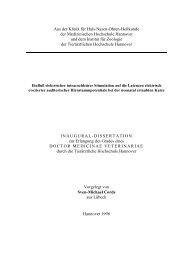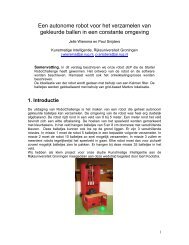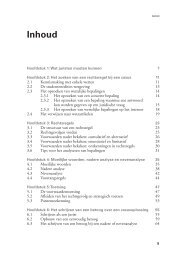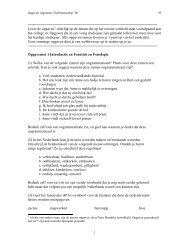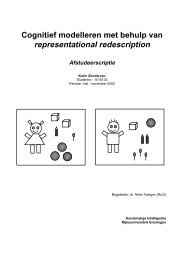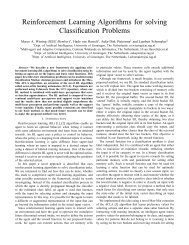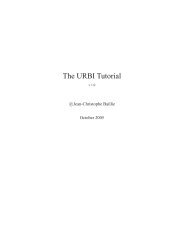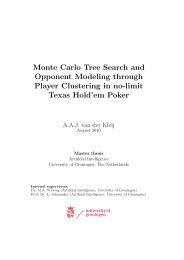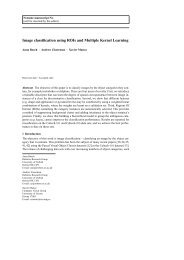Presuppositions in Spoken Discourse
Presuppositions in Spoken Discourse
Presuppositions in Spoken Discourse
You also want an ePaper? Increase the reach of your titles
YUMPU automatically turns print PDFs into web optimized ePapers that Google loves.
Chapter 5<br />
requirement to accommodation which says that the result of accommodat<strong>in</strong>g the<br />
presupposition must be an epistemically defensible discourse.<br />
Note that chang<strong>in</strong>g these examples so that the subject of the factive is no<br />
longer the speaker, as done <strong>in</strong> (5), or chang<strong>in</strong>g the tense of the verb so that it is no<br />
longer present tense, makes global accommodation preferred. Embedd<strong>in</strong>g an<br />
example like (4) under a modal operator, will also make global accommodation<br />
preferred, as illustrated <strong>in</strong> (6).<br />
(5) John doesn’t really know that he is go<strong>in</strong>g to be a vast amount of help to you.<br />
(6) I might not know that I am go<strong>in</strong>g to be a vast amount of help to you.<br />
The preferred <strong>in</strong>terpretation of (5) globally accommodates the presupposition, and<br />
it will mean someth<strong>in</strong>g like “John isn‘t aware that he will be a vast amount of help<br />
to you.” This is because the speaker and the subject are no longer the same<br />
<strong>in</strong>dividual, and there is no longer a conflict between the <strong>in</strong>formation presupposed<br />
by the speaker and the beliefs attributed to the subject of the factive.<br />
Trapp<strong>in</strong>g, and a phenomena similar to trapp<strong>in</strong>g, were the ma<strong>in</strong> causes of<br />
presupposed <strong>in</strong>formation be<strong>in</strong>g prevented from project<strong>in</strong>g out of embedded<br />
contexts. These are cases where the presupposed proposition triggered <strong>in</strong> an<br />
embedded context conta<strong>in</strong>s as an argument a reference marker that was also just<br />
<strong>in</strong>troduced with<strong>in</strong> that embedded context, mak<strong>in</strong>g it impossible for the<br />
presupposed proposition to be accommodated higher than the context where the<br />
reference marker was <strong>in</strong>troduced because the argument would then become<br />
unbound.<br />
(7) aspectual verb, triggered p: A pattern is not work<strong>in</strong>g at time t-1 (LOCAL)<br />
(1-2@ 649)<br />
Speaker A: When we‘ve got a bit more [<strong>in</strong>f] <strong>in</strong>formation, and if we‘ve seen a<br />
patterntrapped referent that beg<strong>in</strong>s to work [@m] With [@m] with an<br />
Austrian university<br />
In (7), Speaker A and another (not shown) are discuss<strong>in</strong>g sett<strong>in</strong>g up a program or<br />
research cooperation between their university and universities abroad. Whether the<br />
program will become reality or not is still unclear and they are at the plann<strong>in</strong>g stage<br />
at the time of the discussion. Up until the sentence and if we’ve seen a pattern they are<br />
discuss<strong>in</strong>g which Italian universities would make possible partners and that the<br />
pattern would have to first work with these universities. After this, someth<strong>in</strong>g else<br />
will be implemented with and Austrian University. Here it is necessary to read a great<br />
deal of the previous context to understand that the pattern referred to is a<br />
discussion of how the exchange will work <strong>in</strong> practice between their university and<br />
the Italian universities.<br />
This becomes a case of trapp<strong>in</strong>g because the presupposed state that could be<br />
described as ‘a pattern is not work<strong>in</strong>g earlier’ conta<strong>in</strong>s a reference a pattern, whose<br />
reference marker is <strong>in</strong>troduced <strong>in</strong> the context created by the if-clause. Global<br />
accommodation would make the discourse undef<strong>in</strong>ed because the reference marker<br />
106



